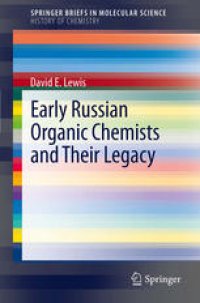
Ebook: Early Russian Organic Chemists and Their Legacy
Author: David E. Lewis (auth.)
- Tags: Organic Chemistry, History of Science, History
- Series: SpringerBriefs in Molecular Science 4
- Year: 2012
- Publisher: Springer-Verlag Berlin Heidelberg
- Edition: 1
- Language: English
- pdf
The organic chemists of Russia during the pre-revolutionary period included some of the most creative and talented chemists of the nineteenth and early twentieth centuries. Indeed, this is attested by the number of reactions and empirical rules bearing their names. This volume is of interest for both historians of chemistry and organic chemists wishing to discover more about the historical development of their discipline in Russia. From the founding of the Russian Academy of Sciences by Peter the Great in 1725 to the early years of the nineteenth century, Russian organic chemistry was largely in the hands of foreign scientists. However, the Russification of organic chemistry in Russia had begun before the middle of the nineteenth century, and reached its zenith during the last half of the same century, by which time vibrant schools of chemistry had arisen in the eastern city of Kazan', at Moscow and at St. Petersburg. By the end of the century, the Chairs of organic chemistry at universities throughout the Russian empire were occupied by Russian chemists, almost half of them trained at Kazan'. This volume discusses the contributions of these organic chemists which include: the structural theory of organic chemistry, empirical rules for addition and elimination, reactions involving carbon nucleophiles, such as the aldol reaction and alcohol synthesis using organozinc nucleophiles, the discovery of sulfoxides and sulfonium salts, and a range of important redox reactions.
The organic chemists of Russia during the pre-revolutionary period counted among their number some of the most creative and talented chemists of the nineteenth and early twentieth centuries, as is attested to by the number of reactions and empirical rules bearing their names. From the founding of the Russian Academy of Sciences by Peter the Great in 1725 to the early years of the nineteenth century, Russian organic chemistry was largely in the hands of foreign scientists. The Russification of organic chemistry in Russia had begun before the middle of the nineteenth century, and reached its zenith during the last half of the same century, with vibrant schools of chemistry arising in the eastern city of Kazan', and at Moscow and St. Petersburg. By the end of the century, the Chairs of organic chemistry at universities throughout the Russian empire were occupied by Russian chemists, almost half of them trained at Kazan'. The contributions of these organic chemists encompass the structural theory of organic chemistry, empirical rules for addition and elimination, alcohol synthesis using organozinc nucleophiles, sulfoxides and sulfonium salts, and a range of redox reactions, as well as the aldol addition. The decades before the Bolshevik Revolution in 1917 saw a broadening of the chemistry developed by Russian organic chemists. In this Brief, the history of the development of organic chemistry in Russia is discussed.